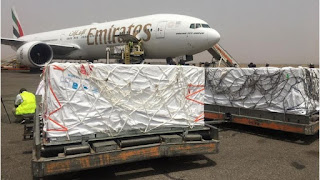Steps To Get The Covid-19 Vaccine In Nigeria
Nigeria has just received a total of 3.92 million doses of the AstraZeneca vaccine today, March 2nd. Following this development, the National Primary Health Care Development Agency (NPHCDA) launched an online portal and announced the guidelines for registrations.
 |
| AstraZeneca vaccine arrive Nigeria |
What Is Astrazeneca Vaccine
The University of Oxford produces the AstraZeneca vaccine. It is a vaccine that aims to protect against COVID-19. A single shot of the Oxford-AstraZeneca vaccine is highly protective, reducing the chance of someone getting ill and needing hospital treatment by more than 80%.
How It Is Made
It is made from a weakened version of a common cold virus (known as an adenovirus) from chimpanzees. It has been modified to look more like coronavirus - although it can't cause illness.
Read Also: The problem with Covid-19 vaccine design and development
Scientists take genes for the spike protein from the surface of the coronavirus and put it into a weakened version of a common cold virus. This is then injected into the body.
How The Vaccine Work
Once injected, it teaches the body's immune system how to fight the real virus, should it need to. The vaccine enters cells which then start to produce spike protein. The body's immune system reacts by producing antibodies and activates T-cells to destroy cells with spike protein. Presence of coronavirus triggers the antibodies to fight the virus.
The Oxford vaccine can be stored in a normal fridge. This makes it much easier to distribute in countries like Nigeria.
A single dose of the Oxford vaccine offered 76% protection for three months, and this went up to 82% after the second dose.
 |
| Oxford Vaccine |
How To Register
Registration requires a device with a working internet connection. Nigerians who want to register can visit the NPHCDA’s registration portal at https://www.nphcdaict.com.ng/publicreg/.
Filling Data
1. Full name
2. Phone number
3. Contact address
4. Ward of residence
5. LGA
6. State
7. Email address
8. Date of birth
9. Sex
10. Form of ID
You are also meant to select your preferred vaccination date and time slot and upload a photograph. The form asks if you work in the health sector and if you have any medical conditions or allergies.
Lastly is a captcha code to verify you are not a robot. Click submit.
You should receive a message that your registration has been completed. You will also be issued a vaccination ID. The message goes thus:
“Registration Completed! Your Vaccination ID is:
Your data is successfully received.
Thank you for taking the time to fill the form, you will receive an SMS and email shortly containing your Vaccination No. and other instructions.”
For more information, please call: 0803 123 0415, 0803 123 0416
Eligible
Healthcare workers top the list of people who will receive the vaccine first. Away from them, the NPHCDA said it will prioritise “frontline workers – the military, police, oil and gas workers, customs workers, and strategic leaders.”
Nigerians living in West Africa countries can register. Note that this vaccine is only available to people over the age of 18 years.
Nigeria will be the third African country to receive a vaccine under the COVAX scheme, after Ghana and Ivory Coast. It should be noted that the vaccine will be administered without charges and the country is expected to receive a total of 16million free doses from COVAX in the coming months.
What We Don't Know
Vaccines take years to design and develop. To design and develop a safe and effective vaccine there are three stages of clinical trials. This span years. Unfortunately, due to the nature of the coronavirus pandemic, the AstraZeneca vaccine was rushed. Clinical trials only lasted for a few months. Data gathered so far is that the vaccine is effective. It's safety cannot be guaranteed with a few months of clinical trials. The information normally gathered from long-term post surveillance is missing. This leaves us with so many questions with little or no answer.
Read Also: Drug Vs vaccine in fighting coronavirus pandemic
The first thing is that vaccinated people may still contract the virus. Now the big question is if they can transmit the virus to healthy persons. Also, no one knows how long the immunity against Coronavirus will last. And lastly, no one knows for sure if there will be any negative effects in the future due to lack of long-term post surveillance.
From the above, it is clear that those who receive the vaccine we still have to abide by all the rules guiding prevention of Coronavirus. Vaccinated persons still need to always wear face masks in public, wash hands regularly and avoid public gatherings. This is mainly to protect their loved ones not yet vaccinated from contracting coronavirus from them.

Comments
Post a Comment
Please have your say